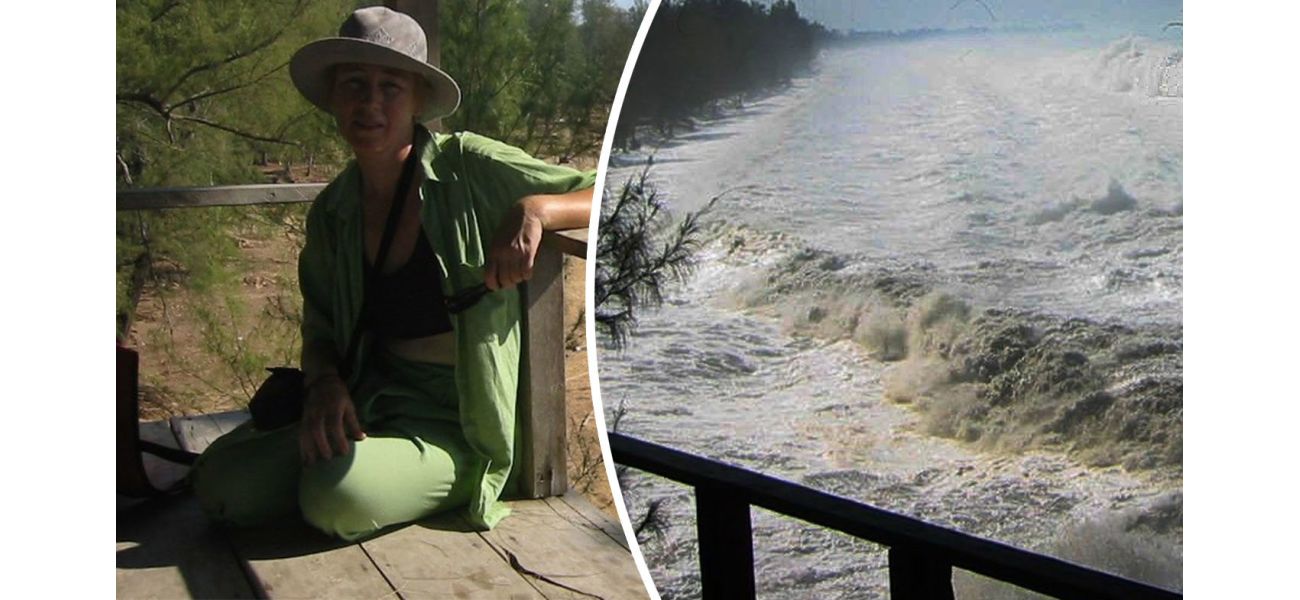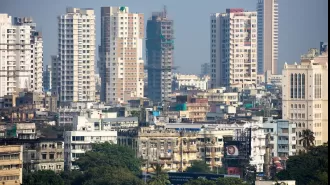Kimina's trip to an island ended in the biggest tsunami ever recorded.
Kimina Lyall saw a wave on the horizon, and little did she know that her life was going to transform.
December 26th 2024.

I recently had the opportunity to speak with Australian journalist Kimina Lyall, who spent years as a correspondent in Thailand. She shared with me her incredible story of survival and resilience in the face of unimaginable tragedy.
It all began on a seemingly normal morning on December 26, 2004. Kimina had just finished filing an article and was meeting with her partner at a resort on Ko Phra Thong, a small island known as the "Golden Buddha Island." But what started as a routine day quickly turned into a nightmare.
A loud sound suddenly pierced the air, causing Kimina and her partner to look around in confusion. They initially thought it was a plane crash, but then they noticed something strange happening on the horizon. A massive wave was quickly approaching the shore, and it was clear that something was terribly wrong.
As the wave crashed onto the beach, Kimina and her partner were in shock. They watched in disbelief as the water rose to the top of the beach and then receded. But their shock quickly turned to terror as they saw another wave forming in the distance.
Most people on the beach were transfixed by the sight, but one woman, who had lived in Japan, knew exactly what was happening. She urgently yelled for everyone to run to safety. It was then that Kimina's instincts kicked in, and she made her way to the top of a nearby hill.
As she climbed, she could feel the ground shaking beneath her feet. The tsunami hit the shore with full force, destroying everything in its path. Kimina's home was among the many buildings that were swept away by the powerful waves.
Tragically, 94 people on Ko Phra Thong lost their lives that day, including 13 people who were on the same side of the island as Kimina. It was a devastating loss for the small community.
But for Kimina, the impact of the tsunami went beyond losing her home and witnessing the destruction. As a journalist, she felt a sense of duty to cover the story and share it with the world. However, she was unable to leave the island due to the lack of boats, and it took her a full day to finally make it to safety.
Once she returned to Australia, Kimina struggled to adjust to her new reality. While the people in Thailand were all united in their understanding of what had happened, in Australia, it seemed like life had moved on. This disconnect made it difficult for Kimina to process her trauma and move forward.
She was eventually diagnosed with PTSD and had to leave her job as a journalist. She felt disillusioned with the industry, unable to return to reporting on trivial news after experiencing something so profound.
But Kimina didn't let the tsunami define her. She went back to university and retrained as a psychologist, using her own experience to help others who had been through similar traumas. She also joined the Dart Centre for Journalism and Trauma, where she worked to train journalists in reporting on trauma and to support those who had been exposed to it.
Despite the tragedy she faced, Kimina has found a way to move forward and make a positive impact in the world. She continues to return to Thailand, where she wrote her book, "Out of the Blue: Facing the Tsunami," which details her experience and the lessons she learned from it.
As we approach the 20th anniversary of the tsunami, Kimina reflects on how the event continues to affect her. She admits that, despite thinking she wouldn't be affected by it any more than any other day, she has found herself feeling emotional in the weeks leading up to the anniversary.
She believes that everyone has their own personal "tsunami" – a life-changing event that shapes who they are. For Kimina, it was the tragic events of that day in 2004. But through her resilience and determination, she has been able to overcome the devastation and use her experience to help others. Her story is a testament to the strength of the human spirit, and a reminder that even in the face of tragedy, there is always hope for a brighter tomorrow.
It all began on a seemingly normal morning on December 26, 2004. Kimina had just finished filing an article and was meeting with her partner at a resort on Ko Phra Thong, a small island known as the "Golden Buddha Island." But what started as a routine day quickly turned into a nightmare.
A loud sound suddenly pierced the air, causing Kimina and her partner to look around in confusion. They initially thought it was a plane crash, but then they noticed something strange happening on the horizon. A massive wave was quickly approaching the shore, and it was clear that something was terribly wrong.
As the wave crashed onto the beach, Kimina and her partner were in shock. They watched in disbelief as the water rose to the top of the beach and then receded. But their shock quickly turned to terror as they saw another wave forming in the distance.
Most people on the beach were transfixed by the sight, but one woman, who had lived in Japan, knew exactly what was happening. She urgently yelled for everyone to run to safety. It was then that Kimina's instincts kicked in, and she made her way to the top of a nearby hill.
As she climbed, she could feel the ground shaking beneath her feet. The tsunami hit the shore with full force, destroying everything in its path. Kimina's home was among the many buildings that were swept away by the powerful waves.
Tragically, 94 people on Ko Phra Thong lost their lives that day, including 13 people who were on the same side of the island as Kimina. It was a devastating loss for the small community.
But for Kimina, the impact of the tsunami went beyond losing her home and witnessing the destruction. As a journalist, she felt a sense of duty to cover the story and share it with the world. However, she was unable to leave the island due to the lack of boats, and it took her a full day to finally make it to safety.
Once she returned to Australia, Kimina struggled to adjust to her new reality. While the people in Thailand were all united in their understanding of what had happened, in Australia, it seemed like life had moved on. This disconnect made it difficult for Kimina to process her trauma and move forward.
She was eventually diagnosed with PTSD and had to leave her job as a journalist. She felt disillusioned with the industry, unable to return to reporting on trivial news after experiencing something so profound.
But Kimina didn't let the tsunami define her. She went back to university and retrained as a psychologist, using her own experience to help others who had been through similar traumas. She also joined the Dart Centre for Journalism and Trauma, where she worked to train journalists in reporting on trauma and to support those who had been exposed to it.
Despite the tragedy she faced, Kimina has found a way to move forward and make a positive impact in the world. She continues to return to Thailand, where she wrote her book, "Out of the Blue: Facing the Tsunami," which details her experience and the lessons she learned from it.
As we approach the 20th anniversary of the tsunami, Kimina reflects on how the event continues to affect her. She admits that, despite thinking she wouldn't be affected by it any more than any other day, she has found herself feeling emotional in the weeks leading up to the anniversary.
She believes that everyone has their own personal "tsunami" – a life-changing event that shapes who they are. For Kimina, it was the tragic events of that day in 2004. But through her resilience and determination, she has been able to overcome the devastation and use her experience to help others. Her story is a testament to the strength of the human spirit, and a reminder that even in the face of tragedy, there is always hope for a brighter tomorrow.
[This article has been trending online recently and has been generated with AI. Your feed is customized.]
[Generative AI is experimental.]
0
0
Submit Comment





